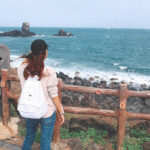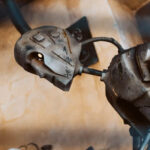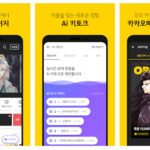
June is LGBTQ Pride Month, and in case you were looking for some literature by Korean authors to mark the occasion, here are four books by LGBTQ Korean American authors for your reading enjoyment and enrichment!
Dancer Dawkins and the California Kid by Willyce Kim
Dancer Dawkins and the California Kid is a short novel driven by the charm of new friends and the potency of trickery. Join in on the shenanigans, and you’ll find joy, escapades, comradery, and mischief.
In California, Dancer Dawkins drives up north from LA to visit her beloved Jessica. In Bangor, Maine, Willie Guthrie leaves her home to find adventure in the West and names herself the California Kid. When the Kid smashes her car into Dancer’s car in San Francisco, Dancer gets out of her car and punches the Kid’s lights out. As they try to sort things out at a restaurant, they meet the owner, Ta Jan the Korean, as well as her lovably astute dog, Killer Shep. Once the motley crew surmises that Jessica is likely involved with an unsavory bunch with a sour reputation, they join forces to save Jessica from a menacing, secretive society.
Author Willyce Kim is recognized as the first lesbian Asian author to be published in the US, and this, her first novel, is an undeniably fun adventure. The characters are goofy and relatable, and the trouble they get themselves into delivers spirited fun. Kim’s vibrant poetic language is whimsical, sarcastic, and erotic. The vignettes that structure the work produce quick shifts in perspective that make for a multidimensional rhythm. Also not to miss out on are Kim’s descriptions of food, which are absolutely sumptuous.
Dancer Dawkins and the California Kid will appeal to readers who are looking for a bit of light adventure, humor, and a writing style that packs sentences to the brim with playful, creative flair.
How To Write an Autobiographical Novel by Alexander Chee
Though the title How to Write an Autobiographical Novel suggests that Alexander Chee’s book is a writing guide, it is not a how-to book by any conventional standards. It does contain plenty of hard-won wisdom and advice, but it is actually a collection of essays whose personal reflections, intimate portraits, and expressive perspectives read more like a photo album or Künstlerroman.
Through Chee’s clever prose, confident voice, and experienced essayistic hand, we watch the author sketch and frame his life. We encounter him early on as a fifteen-year-old exchange student in Mexico and as a college student at Wesleyan University; we catch glimpses of him in San Francisco as an AIDS activist and in drag; we follow along as he gets his MFA from the Iowa Writers’ Workshop, takes on odd jobs to make ends meet, publishes his first novel, and becomes a teacher of writing himself. Amounting to more than the telling of a life, these snapshots offer readers well-developed insights into the art and craft of writing, trauma and healing, and Chee’s identity as a gay mixed-race Korean American man.
How to Write an Autobiographical Novel has been named a best book of the year by countless major publications and won the Publishing Triangle’s Randy Shilts Award for Gay Nonfiction, among other accolades; additionally, Chee’s 2001 novel, Edinburgh, is recognized as the first novel published by a gay Korean American man. In this collection, Chee’s talents for style and tempo are on full display, and the careful curation of the essays allows them to converse with one another, adding complexity to themes and ideas that make them all the more refined and compelling.
Chee’s essays would be great for readers who want to explore the stories of a contemporary American writer who has thought deeply about writing and trauma, as well as racial, sexual, and national identities. Writers and aspiring writers will also find plenty to appreciate and learn from in terms of life experiences, literary praxis, and textual form.
Ninefox Gambit by Yoon Ha Lee
Yoon Ha Lee’s Ninefox Gambit is a military science fiction novel and the first installment of the trilogy Machineries of Empire. Lee’s writing immerses readers in a completely new world without holding their hands or explicitly defining unfamiliar terms, and it integrates queerness into the storyline without making it a center point. Always one step ahead, this novel challenges readers to keep up with the action as they piece together a mystifying world adorned with beguiling technologies, gruesome battles, and even moments of understated emotional sensitivity.
In the novel, Captain Kel Cheris agrees to recapture the Fortress of Scattered Needles from heretics, seeking to make amends with the reigning government after she deploys unorthodox battle maneuvers. Cheris is a stalwart soldier with a brilliant mathematical mind, and her secret weapon for this mission is the undead military strategist Shous Jedao, an ancient general who has been condemned for the massacre of his own troops. Cheris can’t be entirely sure that she can trust Jedao, but for the two to work together, Jedao is anchored to Cheris, and he becomes a voice implanted in her head as well as her new reflection and shadow.
Ninefox Gambit, written by a Korean American trans man, won the 2017 Locus Award for Best First Novel and was nominated for the Hugo, Nebula, and Arthur C. Clarke Awards. Captivating readers and inviting their active participation, Lee’s detailed worldbuilding astonishes with its combination of vicious military action and advanced technologies akin to magic that power the world. Still, even in a world as distant as this one, intimate moments with characters draw our empathy, making for an engrossing read.
Ninefox Gambit will appeal to science fiction fans looking to lose themselves in a vast other realm that they must decipher like a puzzle. And if you get to the end and find yourself wanting to spend more time in Lee’s remarkable universe, there are always two more books in the trilogy to enjoy.
Soft Science by Franny Choi
Soft Science is an expansive and forceful collection of poetry that revitalizes cyborg discourse and interrogates the borders we build to construct identities and desires. In the collection, Choi thematizes robots, androids, cyborgs, and artificial intelligence, interfacing along the way with the likes of SmarterChild, Siri, Chi from Chobits, the Borg, and Kyoko from Ex Machina.
In Soft Science, Choi thoughtfully melds traditional patterns of language with various logics and symbols derived from technology, computing, and pop culture. She begins each section of the collection with Turing test poems that break up the free verse text with slashes in place of line breaks, and in one poem, she borrows from computer programming syntax to clarify yet preserve the messiness of emotion and memory. The result is a cyborg poetics that highlights how the categories “human” and “machine” intersect with power and politics to differentially affect people of different identities. To be clear, the entanglement of humanness and machineness in Soft Science is not about some universal, apolitical “human” per se. Writing specifically as a queer Asian American femme woman, Choi contemplates her body, desires, and image from the position of her own subjectivity while also courageously confronting the objectifying gazes of others.
Soft Science has been commended by The Paris Review and Book Riot, and has received enthusiastic reviews from reviewers and critics. Since Choi covers such a wide swathe of themes and moods, her lyrical language can be frank, stilted, or jarring just as often as it can be elusive, flowing, or hypnotic. Poetic forms in the collection dazzle in their variations, and the chosen forms often deftly reflect the content under consideration, such as a sonnet corona about sex and Chatroulette.
Soft Science will appeal to readers interested in rethinking language and expression as it relates to our identities, technology, and politics shadowed by the internet and Donald Trump.















